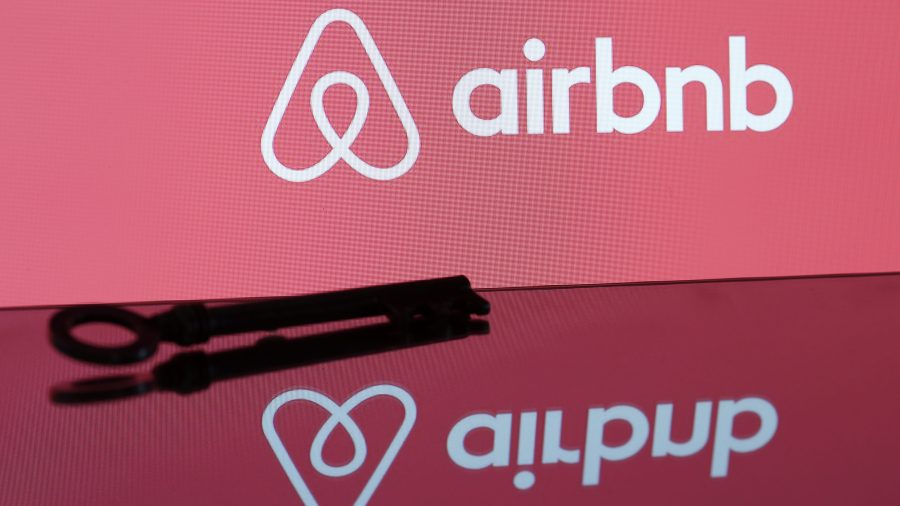As New York cracks down on rentals, Airbnb hosts go underground

As recently as August, Airbnb was doing brisk business in New York City, with more than 22,000 listings there. Two months and a citywide crackdown later, that number has fallen to just above 3,000, a decrease of more than 80%.
Local Law 18, which took effect last month, requires hosts of short-term rentals on Airbnb, Vrbo and similar sites to register with the city and live in the property they’re renting out. It also limits the number of guests per booking to two.
Supporters say it will improve safety for guests and ease pressure on the city’s hot housing market. Airbnb calls it a de facto ban.
Marketplace’s Lily Jamali spoke with Amanda Hoover, a staff writer at Wired, who’s been following the fallout. She says Local Law 18 has prompted people to use other routes to find a place to stay.
The following is an edited transcript of their conversation.
Amanda Hoover: What I’ve seen is that people are moving to places like Craigslist and Facebook Marketplace or different Facebook groups and either asking for short-term rentals or listing them. You see some people asking, “Is there anywhere I can stay for this week in November?” and maybe somebody comments and says, “Yes, I have a place.” You also see listings on Craigslist if you search for the word “Airbnb,” you have people literally writing, “This is not a sublet, this is an Airbnb.” There’s also a website called Houfy where I’ve seen a lot of people that are listing properties that are formerly or are also still listed on Airbnb. This platform doesn’t process payments. Instead it allows people to connect with hosts directly to pay them in other ways. So, what all of that does is it shows that there is still this short-term rental market happening in New York City. But now it will be happening without some of the protections provided by Airbnb.
Lily Jamali: Talk to me more about that. What are some of the issues with these listings moving to those platforms — Craigslist, Facebook Marketplace and some of the other sites that you mentioned?
Hoover: With short-term rental platforms, it wasn’t always perfect. There have been dangerous things that have happened when people have stayed in Airbnbs, but there’s some insurance around your booking. Things are verified and if something goes wrong, you can get your money back. If you just Venmo somebody across the internet with the hope that when you show up at some Craigslist apartment in a month, it’ll be there and there’ll be keys for you. But it might not be. Airbnb was trying to do more identity verification and trying to do more background checks. It wasn’t a perfect system, but that’s now gone unless these people really want to try to do that on their own and try to trust that the person on the other end of the transaction is who they say they are. It’s just much more difficult. And so, over time, we might start to see some issues.
Jamali: So why did New York City enact this ordinance?
Hoover: There’s kind of two things at play here. One is rental affordability, which in New York City is not good. We saw during the height of the COVID-19 pandemic that a lot of people left the city and rents really dropped, but that was an outlier. Mostly rents have been increasing a lot in New York City. There’s also housing shortages, a lot of people are really rent-burdened and facing housing insecurity. So, there’s the idea that people are listing full apartments on platforms like Airbnb, Vrbo or Booking.com that could go to actual full-time New Yorkers and that’s taking away from some of the housing supply. That’s one argument.
The other argument is that the city says that there were a lot of complaints from residents living near short-term rentals. We see that these rentals bring parties, noise, trash, sometimes even shootings happen. Both arguments really are ones we see around the country and around the world when local communities are kind of pushing back against how popular short-term renting has become.
Jamali: Let’s talk about Airbnb’s response. CEO Brian Chesky was just asked about New York’s restrictions and he told the travel website Skift that he expects hotel prices and rents there will be higher next year. He said, “The reason why is because a lot of New Yorkers were actually pretty regular, ordinary people that were dependent on Airbnb to pay their rent or mortgage.” Does the data we currently have back that up? Especially on the rental front and this idea that people are depending on income from Airbnb to pay their rent or their mortgage.
Hoover: That’s something that I personally have not seen a lot of hard data on. It’s a lot of anecdotal stories. I’ve talked to people and to hosts that have either done this to help pay their mortgage, or if they had some extenuating circumstance that took them away from their property, they were able to keep their apartment by doing this until they were ready to come back.
To the question of will rents get more expensive over time, we see New York rents rising all the time. Any New Yorker will tell you it’s a scary time when the leases come around and your rent could go up unless you’re in a protected, rent-controlled situation. We saw a lot of people facing really high rent spikes after the height of the COVID-19 pandemic and people were ready to return back to New York City. So, I think it’s a little hard to parse out when there’s so many different things affecting rents in New York.
Jamali: For a decade now, this has been such a key part of Airbnb’s messaging to the public. That this is something that helps people make it through their month and make it through their rental payment or make it through paying their mortgage.
Hoover: Yeah, and I’ve spoken to people that say that really is their situation. And then we see the other side of this, where you have people who go to landlords, sign leases, and then fully list the places on Airbnb. They call it Airbnb arbitrage. So, you see such a mix of people, and some of them say they’re making $50,000 a month once they get a couple of these going. So, you see such a mix in the use cases by hosts and what they’re able to bring in.
I think one thing that’s important to note about the numbers is that we’ve seen short-term listings on Airbnb drop by about 80%. That seems like a lot. Many of those may have gone to longer-term rentals, some of them might just be gone. But when you think about New York City as a city of 8 million people, the housing affordability crisis is not solely hinging on these 18,000 units of apartments. There’s a lot of other issues going on with housing affordability. So, it is a little hard to predict how we might see the impact of this.
Jamali: New York is hardly the only place cracking down on Airbnb right now. What are some approaches that we’ve seen in other cities?
Hoover: Yeah, and that’s one of the things that’s really interesting about following this. There’s such a patchwork approach to ways to try to regulate short-term rentals. You see some cities saying hosts can rent out an entire apartment, but only for a limited number of days per year, maybe 90 or 120. That’s a bit more lenient than these New York regulations in some ways. You see other places limiting regions the rentals can be in. In Arlington, Texas, they were really dealing with a lot of Airbnbs because it’s right near the Dallas Cowboys’ stadium. So, they’ve zoned things a bit differently so that short-term rentals can be near the entertainment district and not in more residential areas. You’ve also seen some cities really trying to get a grip on this by requiring registrations so they can better track everything that’s going on. So, it really is very, very different depending on what city hosts are operating in, which also gives these platforms, like, a lot of different rules and regulations to contend with.
Airbnb CEO Brian Chesky isn’t the only person predicting that hotel prices will rise in response to the company’s forced retreat in New York. But although Local Law 18 took effect in early September, it might take a few more months before we understand its true impact. Airbnb is allowing preexisting reservations made as recently as this summer to remain in effect through Dec. 1. Until then, at least, the money will continue to flow. All eyes will be on New York this holiday tourist season.
I’m old enough to remember a time before Airbnb. What some call a black market is to others just the way we did things back in the day. Whether it’s scouring Craigslist or relying on word of mouth to find a place to stay.
Property owners doing the renting haven’t loved the adjustment. But in the words of one who spoke to New York Public Radio’s website Gothamist, “New Yorkers always find a way.”
The future of this podcast starts with you.
Every day, the “Marketplace Tech” team demystifies the digital economy with stories that explore more than just Big Tech. We’re committed to covering topics that matter to you and the world around us, diving deep into how technology intersects with climate change, inequity, and disinformation.
As part of a nonprofit newsroom, we’re counting on listeners like you to keep this public service paywall-free and available to all.
Support “Marketplace Tech” in any amount today and become a partner in our mission.


















